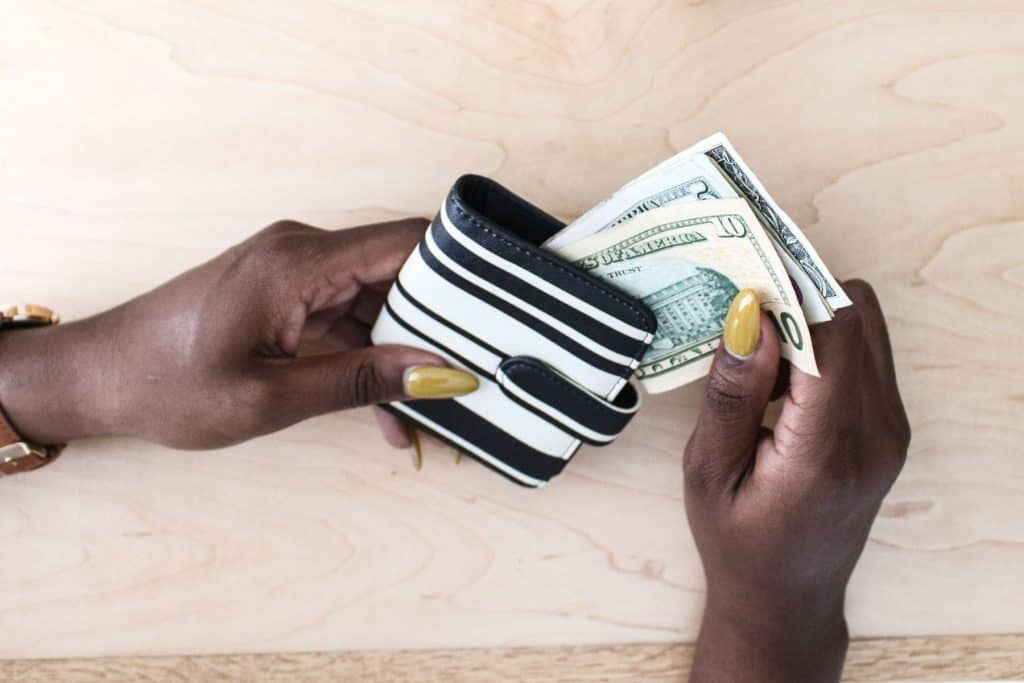Wants And Needs – When You Want Something You Don’t Need

Wants And Needs – Do you always want to buy EVERYTHING?
Here’s what to do when you want something you don’t need (a great gameplan).
We have all been in that spot before.
Where your eyes glaze over and light up seeing something you really, really want but you know it’s something you don’t NEED.
Whether it’s an expensive bag, another cute dog, or a fancy dress, there’s a good chance you don’t really need it.
You might want it desperately, but you certainly don’t need it.
That doesn’t mean you can’t have it, but there’s a good chance you’d be better off without it.
How can you know for sure?
Let’s remember the rule of thumb for successful money management.
STOP SPENDING YOUR MONEY ON THINGS YOU DON’T REALLY NEED!
To do this you will need to learn to differentiate between essential and non-essential items and also understand the difference between a want and a need.
Every time you consider spending your money, ask yourself, “Do I really need this or do I want it?”
There is indeed a big difference.
Note: what you want isn’t always a need.
Technically speaking, a need is something that is of paramount importance to your survival and sustains your life and livelihood.
A want on the other hand is something you simply desire to have, that you may or may not be able to obtain.
We tend to be more lax with this definition when it comes to savings.
In the modern world, needs include things like: food, rent, utilities, phone, insurance, medicine, toiletries, clothing, transportation, cleaning supplies, school fees and the Internet.
Wants, on the other hand, include new clothes, home décor, gifts, eating out, fast food, books, music, movies and extra supplies for your home and school, when you already have enough in stock.
As humans we always want more and sometimes we allow the things we want make us forget the things we have.
We need to be willing however to delay short-term gratification for our long-term goals.
Delayed gratification is the ability to resist immediate temptation in order to receive a more enduring reward later on.
Why is this so important for success in life?
Because instant gratification is usually short-lived, full of regret and also blinds us from our long-term potential.
To be a good saver, you will need to retrain your brain and learn to put your needs before your wants when making a financial decision.
But take note: there is a difference between being cheap and being frugal.
Being a cheap tightwad is always trying to get the lowest price on everything while being frugal is about prioritizing your spending so that you have more of the things you really care about.
And that’s what you want, right?
To have more of the things you really care about?
Try these techniques to be clear on your needs versus your wants:
WANTS AND NEEDS
TIP # 1 – Wait.
When you want something that you don’t really need, you’ll often find that the desire to own it will fade if you give it time.
Whether it’s a new wallet, piece of furniture or the latest cell phone, you might find that you can live without it if you wait 30 days.
See how you feel about it next month.
WANTS AND NEEDS
TIP # 2 – Remind yourself of why you don’t need it.
Be logical with yourself.
Maybe you don’t need a new car because your current car works just fine.
Or, you don’t need a puppy because you already have a dog, a bird, and a tank full of fish.
WANTS AND NEEDS
TIP # 3 – List the disadvantages of acquiring it.
What are the negatives of following through on your impulse?
- For example, a new car is expensive, requires more expensive insurance, and you’ll be worried about someone scratching it. You’re also not sure about how much your boss likes you. It would be challenging to be stuck with a car payment without a job.
- Talk yourself out of it. You are the boss of your money, not the other way around!
WANTS AND NEEDS
TIP # 4 – Avoid buying anything that doesn’t fit into your life.
If you live in an apartment and enjoy your peace and quiet, a noisy bird doesn’t really fit into your life.
Buying snowshoes doesn’t make a lot of sense in Florida.
You don’t need the latest and greatest running shoes if you don’t run.
WANTS AND NEEDS
TIP # 5 – Buy one thing but get rid of two.
If you’re going to buy something, at least make your life a little better by creating some extra space.
For each thing you bring into your home, get rid of at least two.
That way, you’re gaining ground.
WANTS AND NEEDS
TIP # 6 – Find a more suitable substitute.
Why do you want to buy that particular item in the first place?
Perhaps you want to buy a grand piano because you love the sound of a piano.
However, you might not have the space and finances for an 8-foot long, $100,000 piano.
- A small, less-expensive digital piano might be perfect for your situation.
- A cat might be just as good and require less time and attention than a dog.
- A Prius might make more sense than a Mercedes.
- A sports package on your cable box could be a wiser decision than season tickets.
- What benefits does your urge fulfill? Is there a better way to fulfill it?
WANTS AND NEEDS
TIP # 7 – Just say “No.”
Just be strong and tell yourself, “No.â€
For some people, that’s all it takes.
You know you don’t need to eat that doughnut, so don’t.
Some people are better at telling themselves “no” than others.
- Most of us are good, however, at telling ourselves that we’ll begin telling ourselves “no” tomorrow. Unfortunately, we continue telling ourselves that over and over.
WANTS AND NEEDS
TIP # 8- Consider getting it.
If we only acquired the things we truly needed, we’d have little more than bread, water, and a toilet.
Obviously, there’s much more to life than the bare minimum.
We need more.
Just be choosy in what you decide to bring into your life.
Be careful giving in to your wants.
You only have so much time, money, and space.
Maximize their utility.
Take note when you really want something.
You might be leading yourself astray.
Remember the rule of thumb to successful money management again:
STOP SPENDING YOUR MONEY ON THINGS YOU DON’T REALLY NEED!
The second thing to remember is STAY MINDFUL of your money purchases.
We sometimes have this warped idea that we need to have MORE to be happy.
However the truth is LESS is usually the key to happiness: less stress, less mess, fewer commitments, less maintenance, less pressure and fewer distractions.
You aren’t always doing yourself a favor by bringing more material possessions into your home, unless those things are specifically chosen due to necessity or because you are consciously aware that they will make your life better on some life.
Not better in the short term, but better in the long term.
Remind yourself what is most important in your life – whether it is more peace and calm or love and acceptance and use these deep values to help guide your money decisions in life.
If you enjoyed this post, please feel free to share it!








